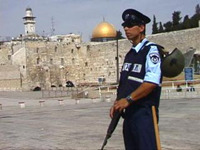Temple Mount in Jerusalem Accepts No Compromise
On March 1, Israelis celebrated its national holiday Purim that commemorates a time when the Jewish people living in Persia were saved from extermination over 2,400 years ago. This holiday is also called “Jewish Carnival.” This year, the parade of people dressed in costumes coincided with the distribution of gas masks to the Israelis, which provoked both jokes and concerns.

It was not the first time when Israelis were provided with gas masks. For a long time it was believed that every citizen had to have one handy and keep it at home. Then the military came to conclusion that it would be better to keep all gas masks in one place and took them back from the people. Nearly 18 months later they are distributing the gas masks again. The officials addressed the nation explaining there were no reasons to worry. The masks are being distributed only because it was decided to reenact the old strategic decision.
Yet, despite the statements of the Israeli officials, it is obvious that they are concerned. The concerns are caused by the disorders organized by Palestinians on the Temple Mount in Jerusalem. Today, the site is closed for the Muslims under 50 years of age, except for women who have unlimited access.
Agency France-Presse reported that 17 people were injured as a result of confrontation between Palestinians and police in the Old Town of Jerusalem. Israeli police spokesman Micky Rosenfeld said that seven people had been arrested, and that two of his men were hurt. Police used tear gas and rubber bullets, while Palestinians were throwing stones at police officers.
The incident started when Israeli police entered the Temple Mount complex, after they said a group of Palestinian demonstrators threw stones at tourists in the Al Aqsa Mosque (Palestinians thought them to be Judaic extremists who came to the temple to pray). Jewish are not allowed to pray on the Temple Mount controlled by the Muslims. Yet, groups of orthodox Judaic make such attempts from time to time.
The Temple Mount is a sacred place for the Jews where, assumingly, the First and Second Jerusalem temples used to be located. Jews face this mountain while praying. The Third Temple on the Temple Mount in Jerusalem will be built after the arrival of the Messiah in accordance with the word of all the Hebrew prophets. The Temple mount is also associated with the wait for the Doomsday.
The al-Aqsa Mosque and Dome of the Rock, currently stand on the site. These structures are considered to be the third holiest site in Islam.
Until 1967 Jews were not allowed not only to the Temple Mount, but also the Wailing Wall. After the “six day war” the access to the Temple Mount was opened for everyone during certain days and hours. Thereare several projects designed to combine the shrines of several religions of the Temple Mount, but none of them are feasible at the moment.
The access to holy sites and control over them are a constant bone of contention for the Muslims and Jews, and one of the reasons for the Arab-Israeli conflict in general. The events that took place near the al-Aqsa Mosque resemble the tragic chronicle ten years ago. Then, in September of 200, the leader of the Israeli opposition Ariel Sharon ascended the Temple Mount. The Muslims on the mountain were so angry that the incident caused confrontations that later developed into a longstanding bloody intifada.
The last incident also caused a reaction. On the evening of February 28, the Organization of the Islamic Conference delivered a speech condemning the actions of the Israeli on the Temple Mount.
The Jordan king Abdullah II expressed his protest from Amman. After his meeting with the head of the Palestinian National Administration Mahmoud Abbas, dedicated to the resumption of negotiations regarding the inclusion of the Cave of the Patriarchs and the Tomb of Rachel to the list of Jewish heritage places, the King and his guest appealed to the world community to protect holy sites in Jerusalem.
The Arab leaders were especially upset with the police intrusion to the Temple Mount because the police did not ask the Muslim administrative council for permission. Naturally, they do not want to consider any excuses provided by police that were performing their duty to provide protection for their citizens.
Yuri Glukhov, a famous Russian political analyst, shared his comments with Pravda.ru. He mentioned that “sore spots” always remind of themselves in a conflict situation. The issue of the Temple Mount is the sore point in the relations of Arabs and Israeli.
“The actions of Israeli police are understandable. During holidays, police is always ready for an emergency response; it is a normal practice all over the world. The reaction of the Muslim world is understandable, too. After a recent incident in Dubai where one of Hamas leaders was liquidated, Arabs suspect Mossad, which makes them very sensitive to Israeli actions.
Although there is no direct evidence confirming Israel’s complicity to the incident in Dubai, we cannot rule out a possibility of retaliation of an Arab terrorist group.”
In other words, confrontation is heightened in the Middle East at the moment. Unfortunately, this state of affairs is not unusual for the region.
Vladimir Potapov
Pravda.Ru
Russia Today: Was "bungled" Dubai assassination a setback for Mossad – and Israel?
Subscribe to Pravda.Ru Telegram channel, Facebook, RSS!





